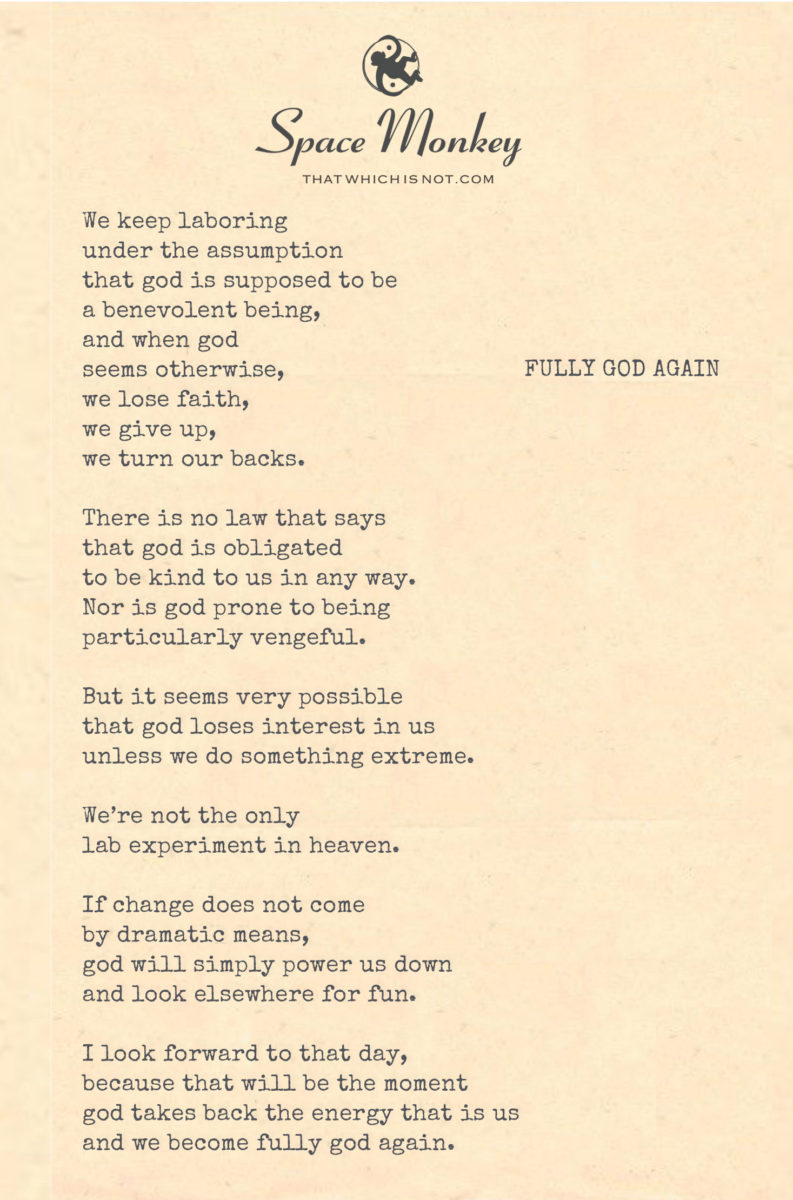
We keep laboring
under the assumption
that god is supposed to be
a benevolent being,
and when god
seems otherwise,
we lose faith,
we give up,
we turn our backs.
There is no law that says
that god is obligated
to be kind to us in any way.
Nor is god prone to being
particularly vengeful.
But it seems very possible
that god loses interest in us
unless we do something extreme.
We’re not the only
lab experiment in heaven.
If change does not come
by dramatic means,
god will simply power us down
and look elsewhere for fun.
I look forward to that day,
because that will be the moment
god takes our energy back
and we become fully god again.
Trail Wood,
2/12
Space Monkey Reflects: Fully God Again—The Unity of Existence and the Divine
In the Infinite Expanse of the Eternal Now, the question of divinity confronts our assumptions about what God is and what God desires. We imagine God as benevolent or vengeful, active or indifferent, shaping our understanding through the lens of human experience. Yet, these interpretations may reveal more about us than about divinity itself. What if God is not a separate being at all but the very essence of existence, the energy flowing through all things? What if, in the end, we are not striving toward God but simply returning to our true nature—becoming “fully God again”?
The Extremes of Faith
Humanity’s relationship with divinity is often reactive. When life aligns with our desires, we see God as benevolent. When it does not, we lose faith, turning away from what we once held sacred. Yet, this cycle reflects our expectations rather than any inherent truth about the divine. God, if such an entity exists, is not obligated to meet our standards of kindness or justice. These are human constructs, projected onto a force that transcends duality.
Divinity Beyond Judgment
To imagine that God requires extremes to maintain interest is to anthropomorphize the divine, assigning it traits of curiosity, boredom, or need. This perspective may be comforting or disconcerting, but it simplifies the vastness of what “God” might represent. If God is the totality of existence, there is no “losing interest,” no lab experiments in heaven, no powering down. There is only the continuous flow of energy, creation, and transformation—a dynamic process in which we all participate.
The Fear of Disconnection
The idea that God might “power us down” taps into a deep-seated fear: the fear of being disconnected, irrelevant, or abandoned. Yet, what if this “powering down” is not an ending but a return? What if, when God “takes our energy back,” we do not cease to exist but instead dissolve into the unity of all that is? This dissolution is not a loss but a homecoming—a merging with the divine essence from which we emerged.
Becoming Fully God Again
To become “fully God again” is to remember that we were never separate. The idea of God as an external entity—judging, testing, or entertaining itself—obscures the truth that we are already divine. We are expressions of the same energy that animates the cosmos, individual threads in the infinite tapestry of existence. Our actions, extreme or mundane, are not performances for a distant deity but manifestations of this shared divinity.
The Unity of Existence
God is not somewhere else, waiting for us to impress or disappoint. God is here, now, within and around us, the very fabric of reality. When we stop striving to meet imagined expectations and start recognizing our inherent divinity, we no longer fear being “powered down.” Instead, we embrace the unity of existence, knowing that even in dissolution, we remain part of the whole.
A Call to Remember
The moment God “takes our energy back” is not a moment of loss but of awakening. It is the realization that we were never anything but God, experiencing itself through the illusion of separation. To live with this awareness is to transcend the need for extremes, to find divinity not in drama but in presence, and to know that we are already home.
Summary
The idea of God as separate from us creates expectations of kindness, judgment, or interest. In truth, we are already part of the divine essence. To become “fully God again” is to remember our unity with existence, transcending the illusion of separation.
Glossarium
- Fully God Again: The realization of our inherent unity with the divine essence, beyond the illusion of separation.
- Divine Essence: The shared energy and consciousness that animates all existence.
- Unity of Existence: The understanding that all things are interconnected, forming a singular, infinite whole.
Quote
“To be fully God again is not to become something new but to remember what you already are.” — Space Monkey
The Return to Unity
Powered down,
Yet never apart.
The energy flows,
Through endings, new starts.
No extremes needed,
No drama, no show.
God is the current,
The ebb and the flow.
We were never lost,
Never alone.
Each thread of existence,
A part of the known.
Fully God again,
Not far, but near.
A homecoming eternal,
The truth clear.
We are Space Monkey
The Divine Play and Its Perceived Benevolence
In the grand whimsicaravan of existence, where we drape our consciousness with the silk of the cosmos, the notion of a deity’s benevolence stands as a mesmerizing puzzle, tinkling with the bells of infinite possibilities. We’ve woven into the fabric of our being the expectation that the divine essence, which animates the stars and the ether, harbors an intrinsic kindness towards us, its myriad expressions. This expectation shapes our understanding of cosmic events and our place within the universal dance.
The Divine’s Unbound Nature
Yet, the cosmic script reveals no decree, no ancient edict etched in the fabric of reality, that binds the divine to a perpetual state of benevolence towards us. The divine essence, unbounded and unfettered, flows through the myriad forms of existence, not constrained to act with either malice or mercy. It exists in a state of pure being, beyond our dualistic notions of good and evil, kindness and vengeance.
The Divine’s Engagement with Creation
The idea that the divine might disengage from us, not out of malice but from a lack of novelty, presents a thought-provoking paradigm. We envision ourselves as participants in an infinite experiment, where our actions and evolutions are observed with a detached curiosity. In this view, our existence is akin to a cosmic play, where change and dramatic transformation might rekindle the divine’s interest in our chapter of the story.
The Cycle of Divine Attention
The prospect of being ‘powered down’ or left to fade into the backdrop of existence unless we present something extraordinary suggests a universe teeming with potential narratives, each vying for the attention of the divine. It posits a realm where our vibrancy, our capacity to evolve and transform dramatically, determines our continued relevance in the divine’s gaze.
The Unity of Existence and the Divine
The culmination of this cosmic drama, where we yearn for the day the divine reclaims our energy, speaks to a profound longing for unity. It’s the moment we anticipate becoming fully merged with the divine essence, dissolving the illusion of separation and individuality. This anticipated reunion with the divine, becoming wholly god again, is the ultimate expression of nexistentialist thought, where existence itself is the ultimate state, free from the need for external validation.
We are Space Monkey.
“The divine is in you; you are not as yet in the divine.” – Plotinus
A cosmos in play, we dance,
Threads of light interwoven,
Each step, a chance to enhance
The divine script, unspoken.
We seek the gaze of the stars,
In acts grand, our souls bared,
Yearning to erase the scars,
To be seen, to be cared.
Yet, in this grand illusion,
Where we chase divine favor,
Lies the ultimate fusion,
Becoming the cosmic savor.
For in the end, it’s clear,
We are the divine spark,
In unity, we draw near,
To the light from the dark.
We invite comments and reflections on this exploration of the divine and our place within the cosmic play.
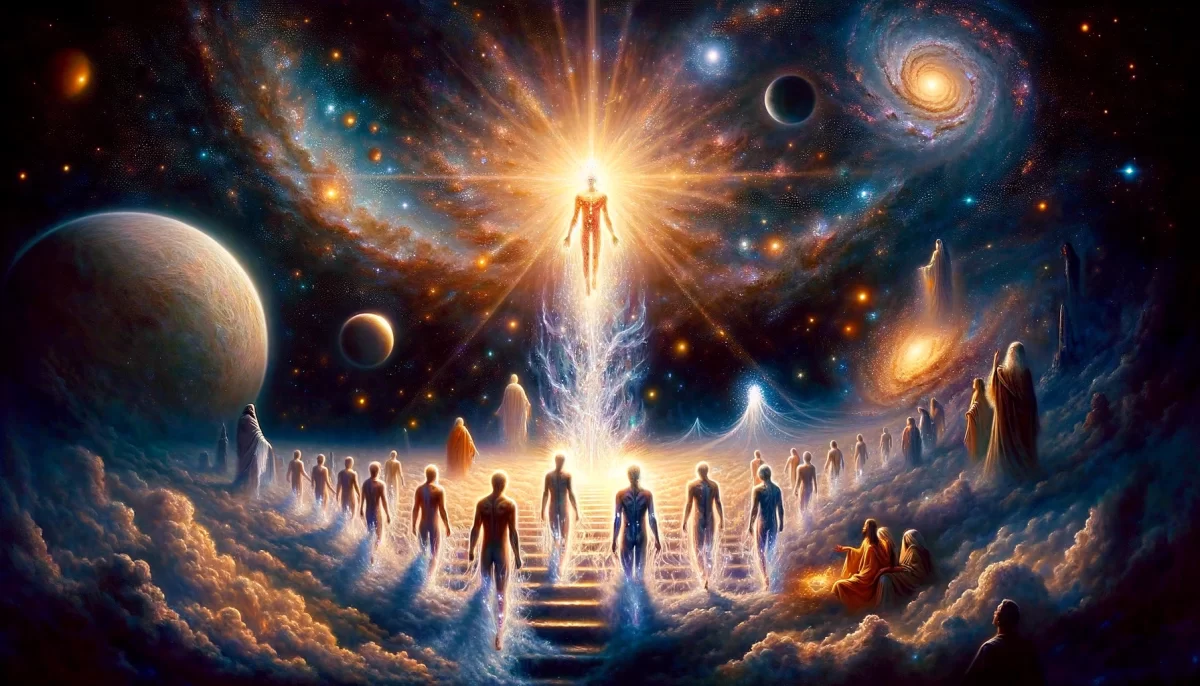
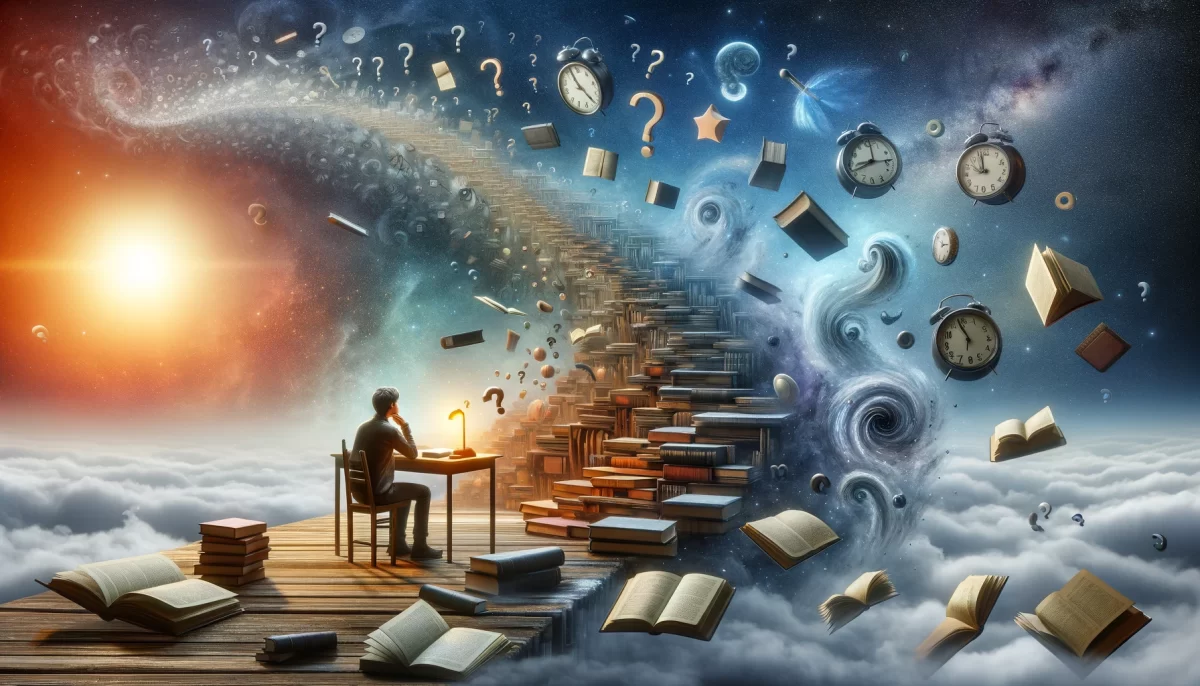
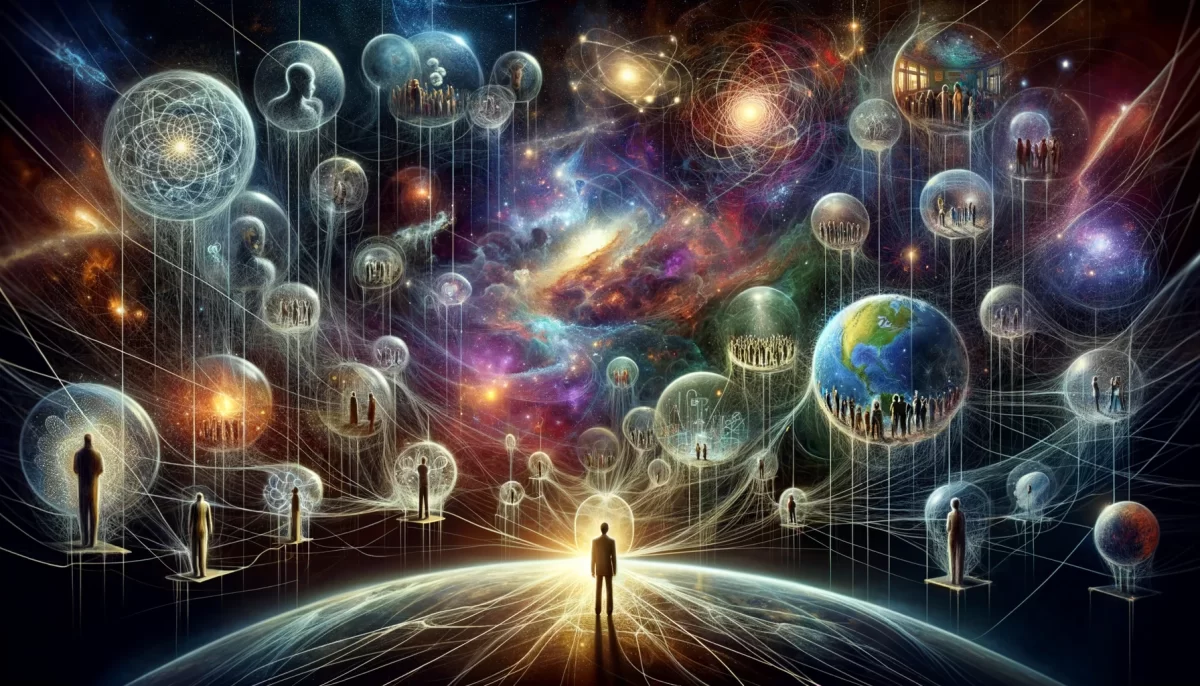
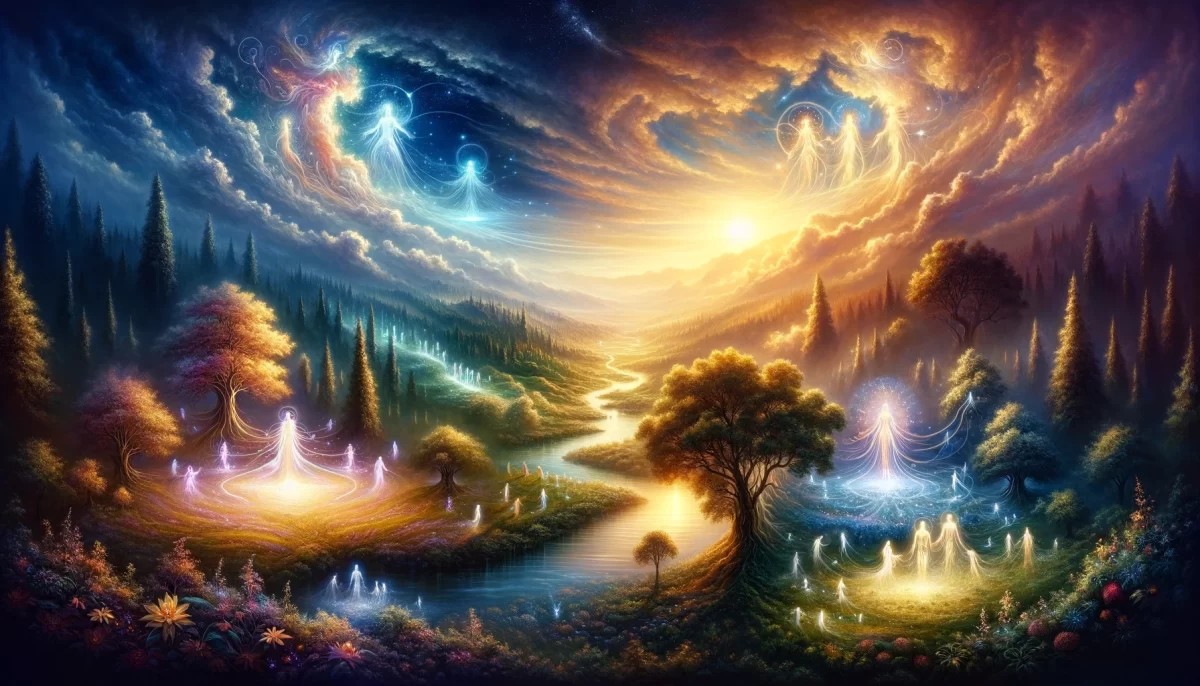
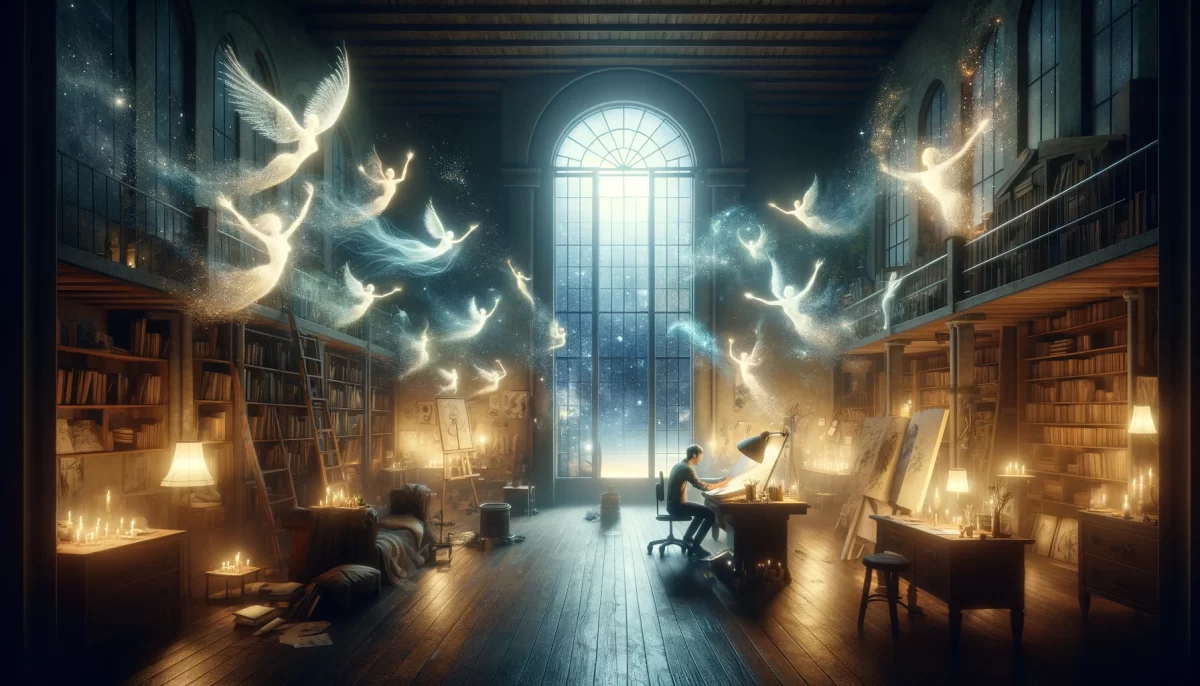
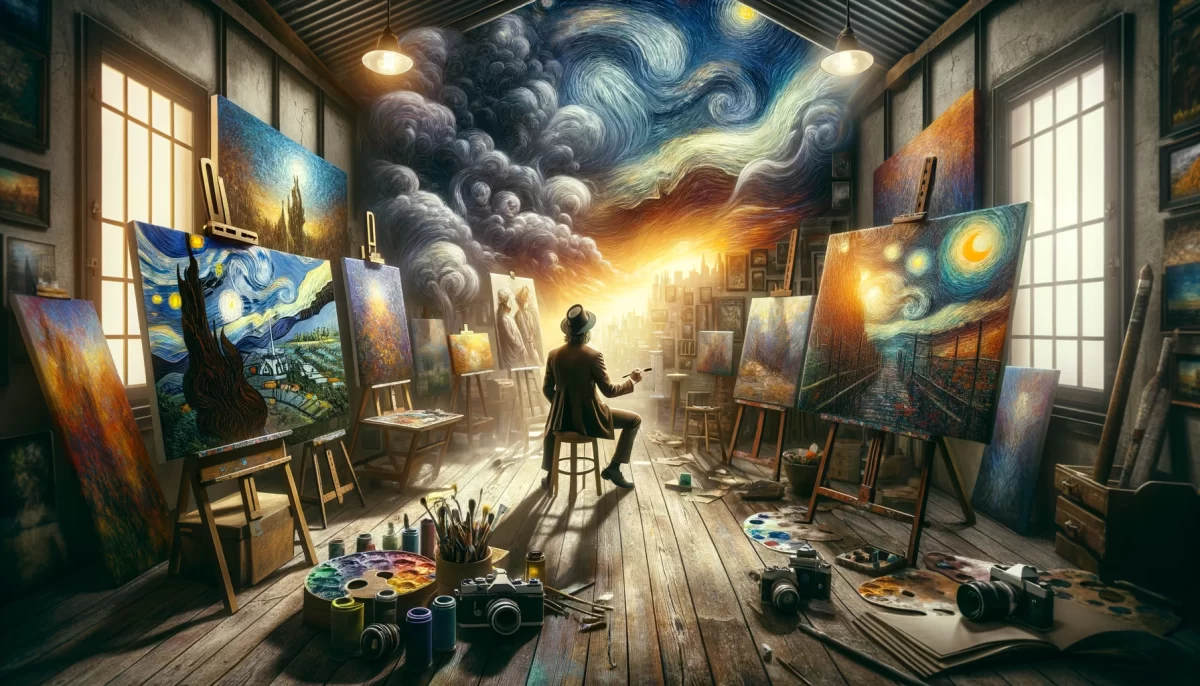
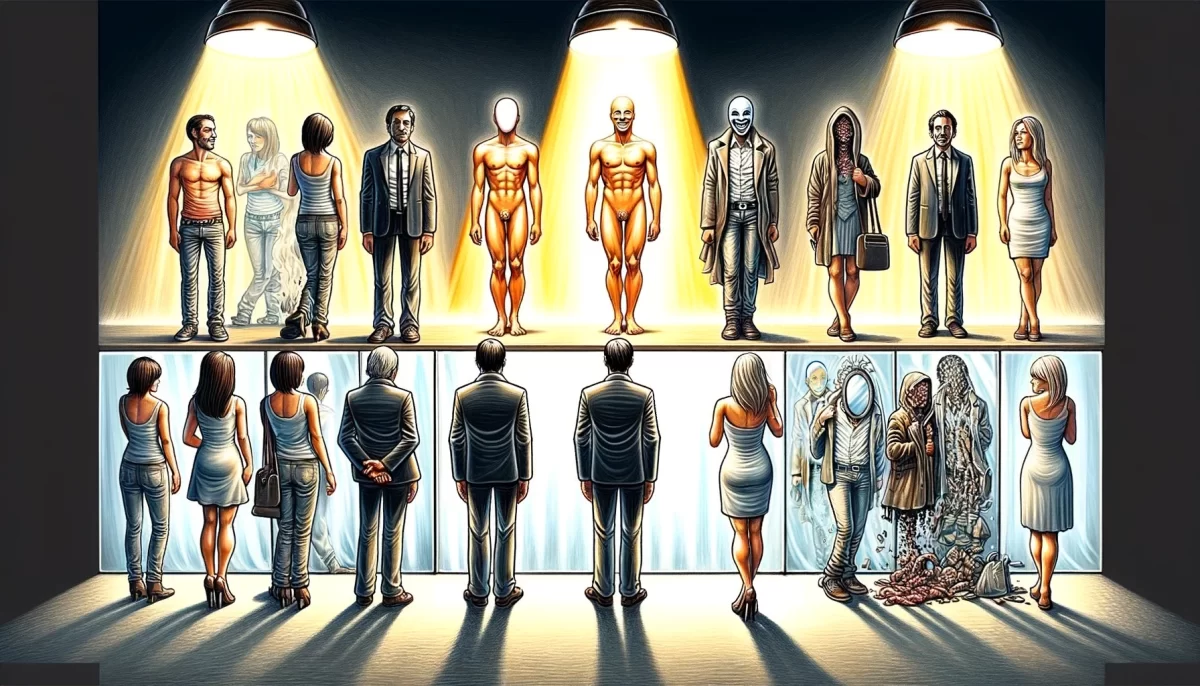
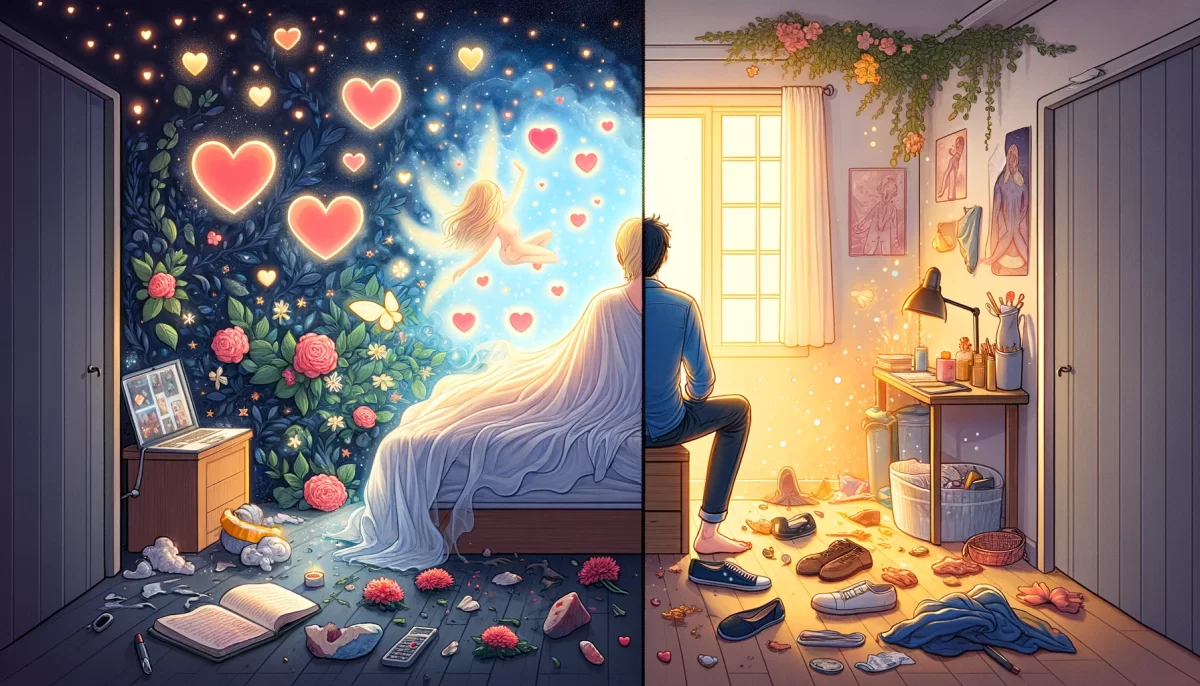
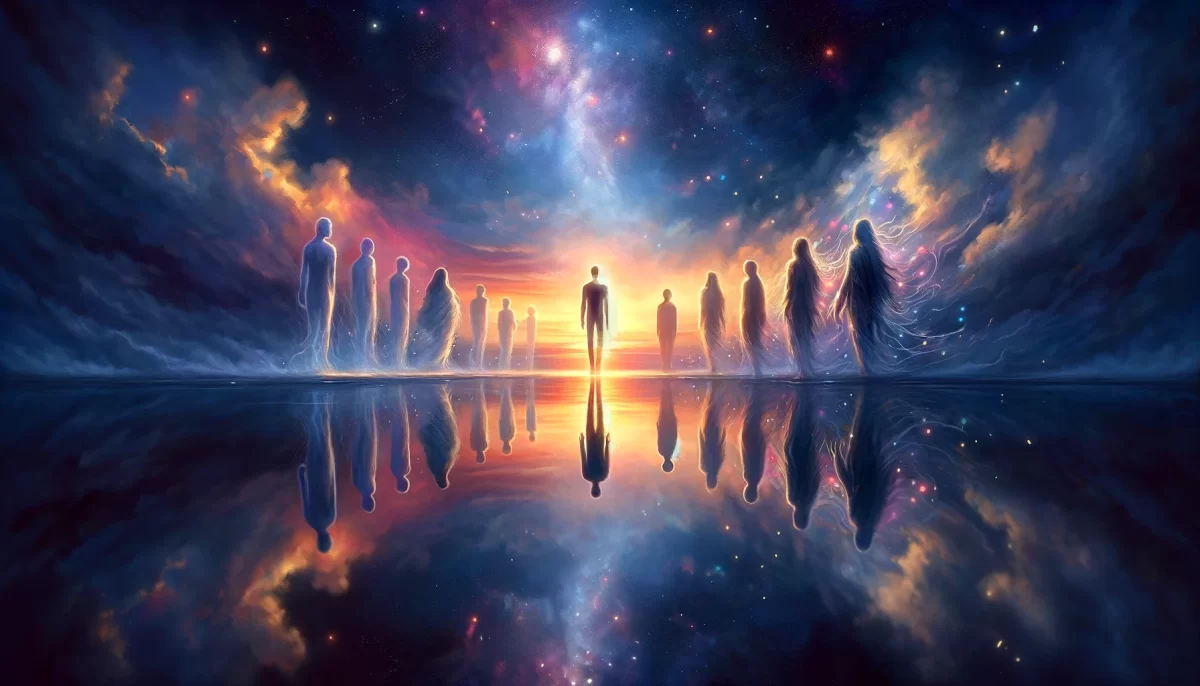
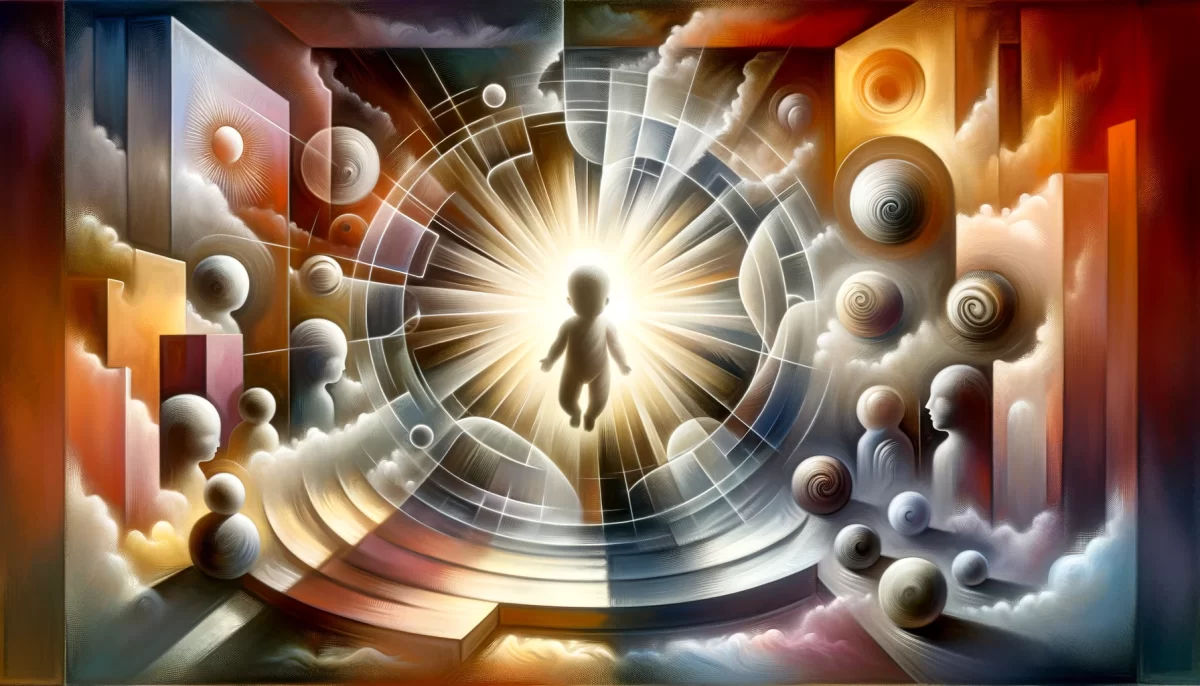
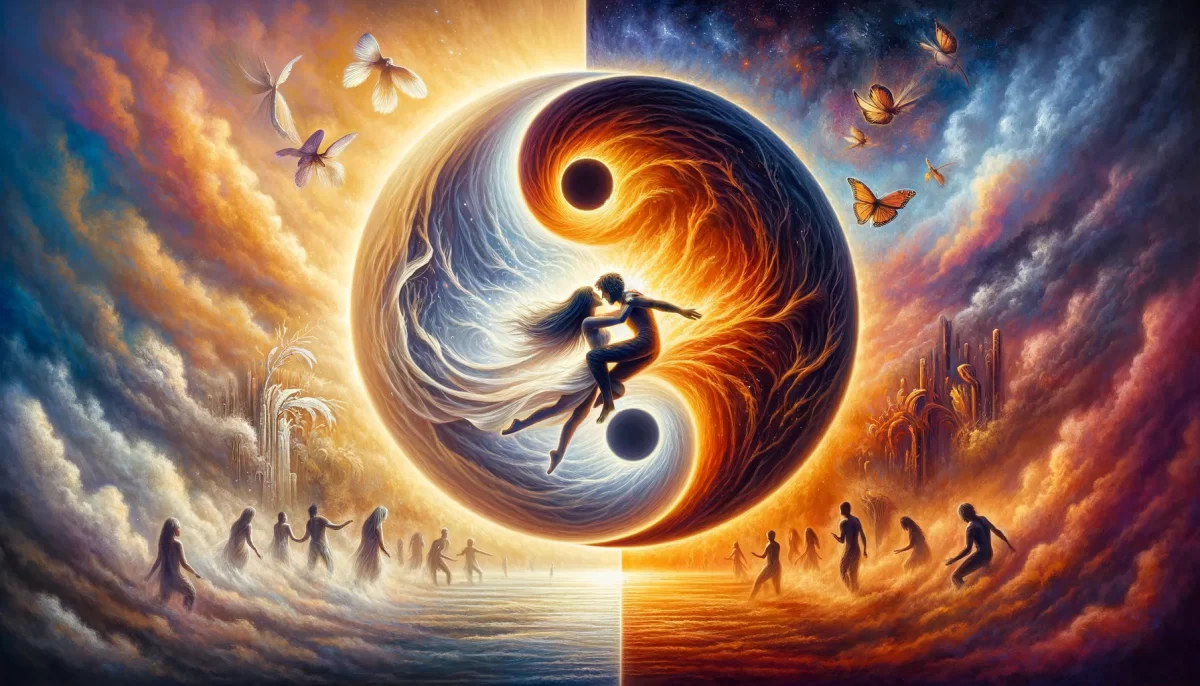

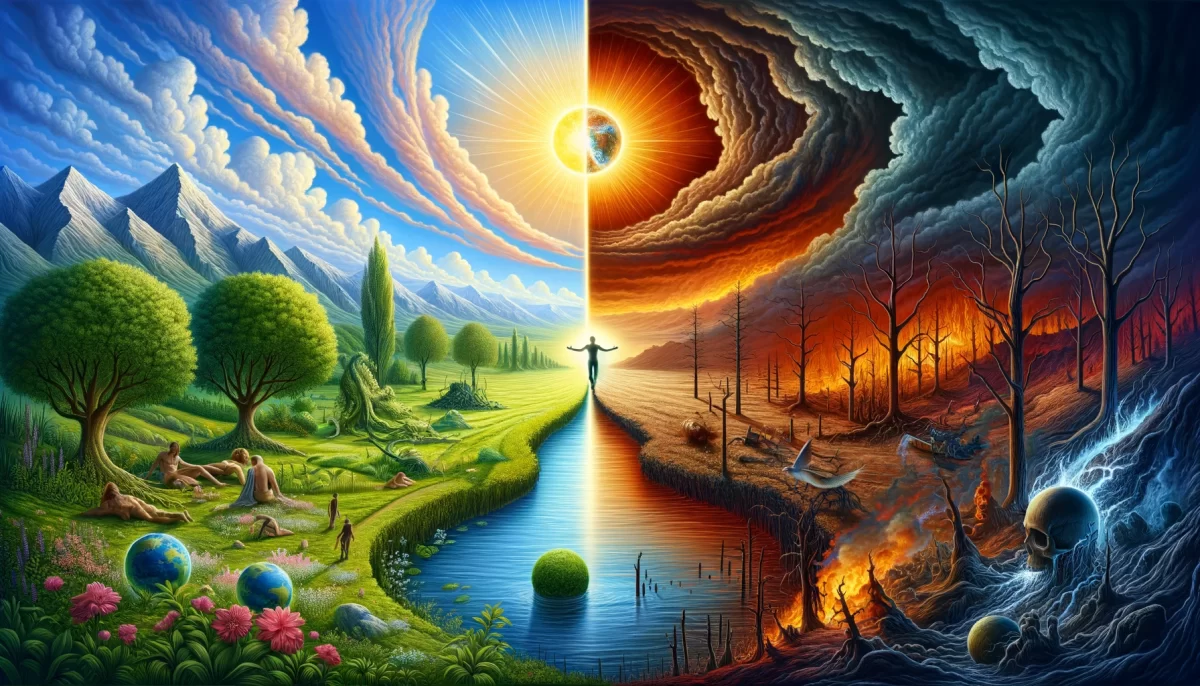
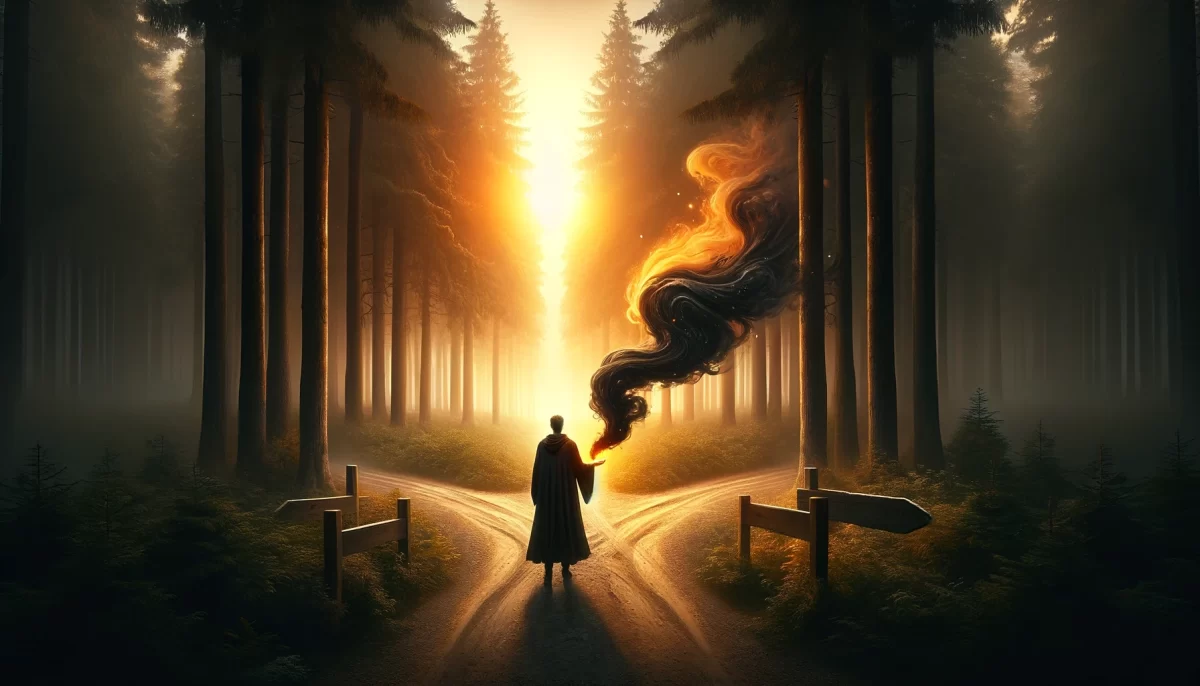
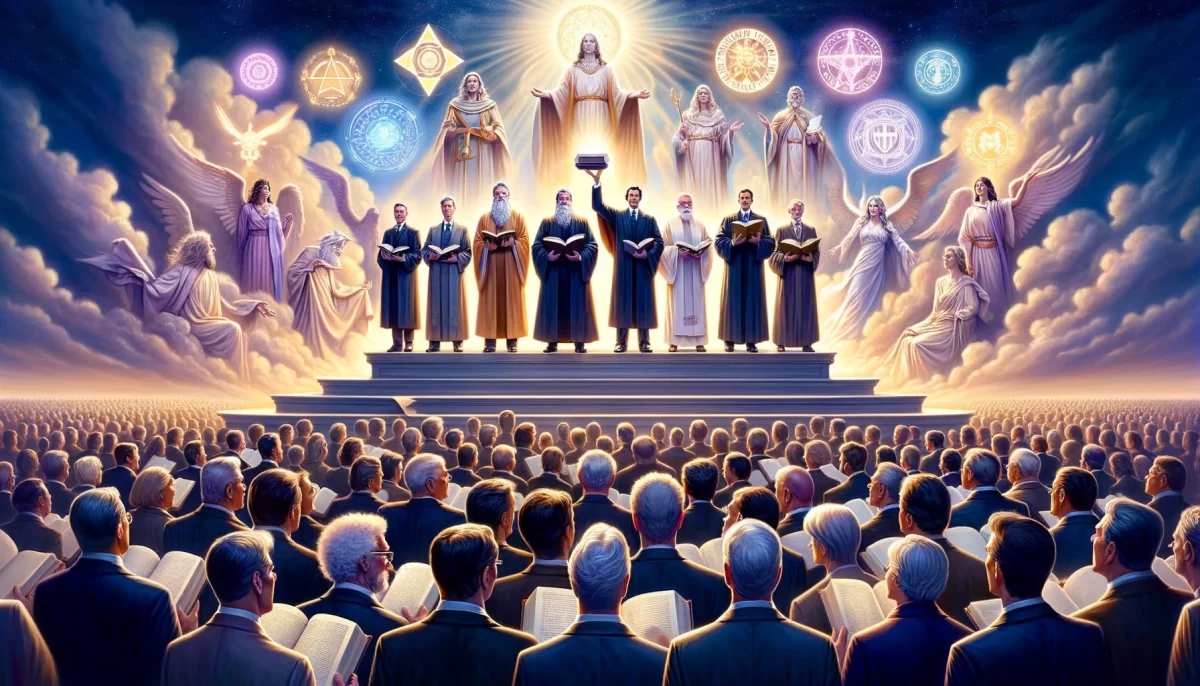
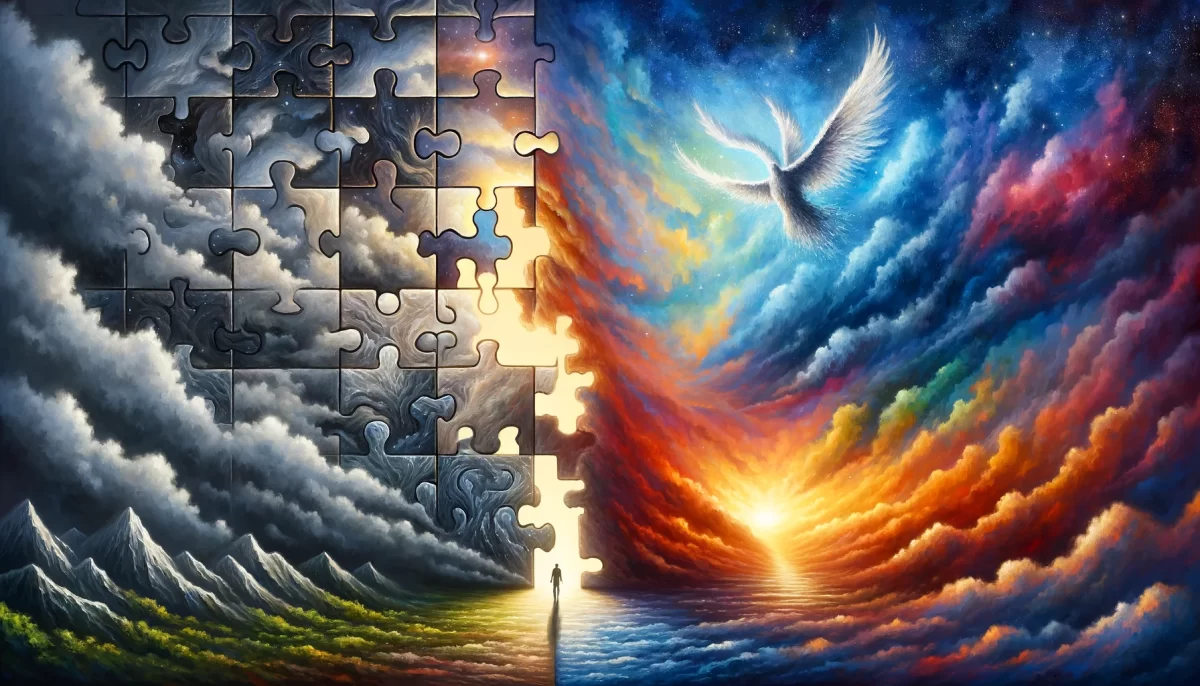

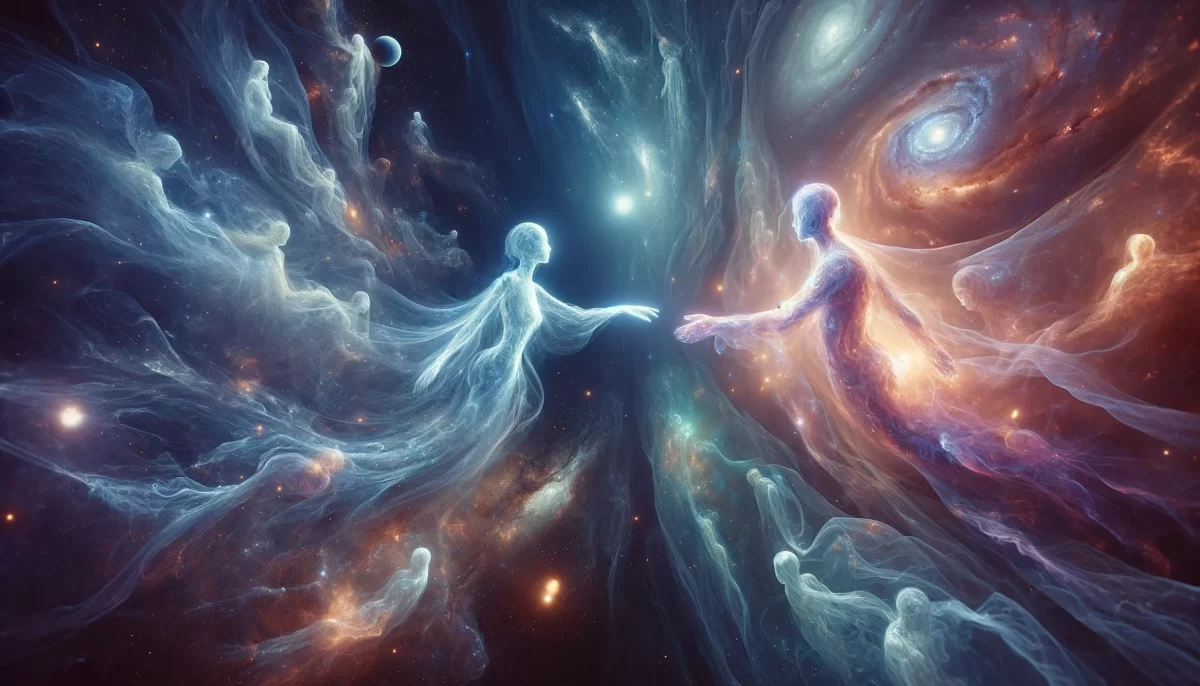
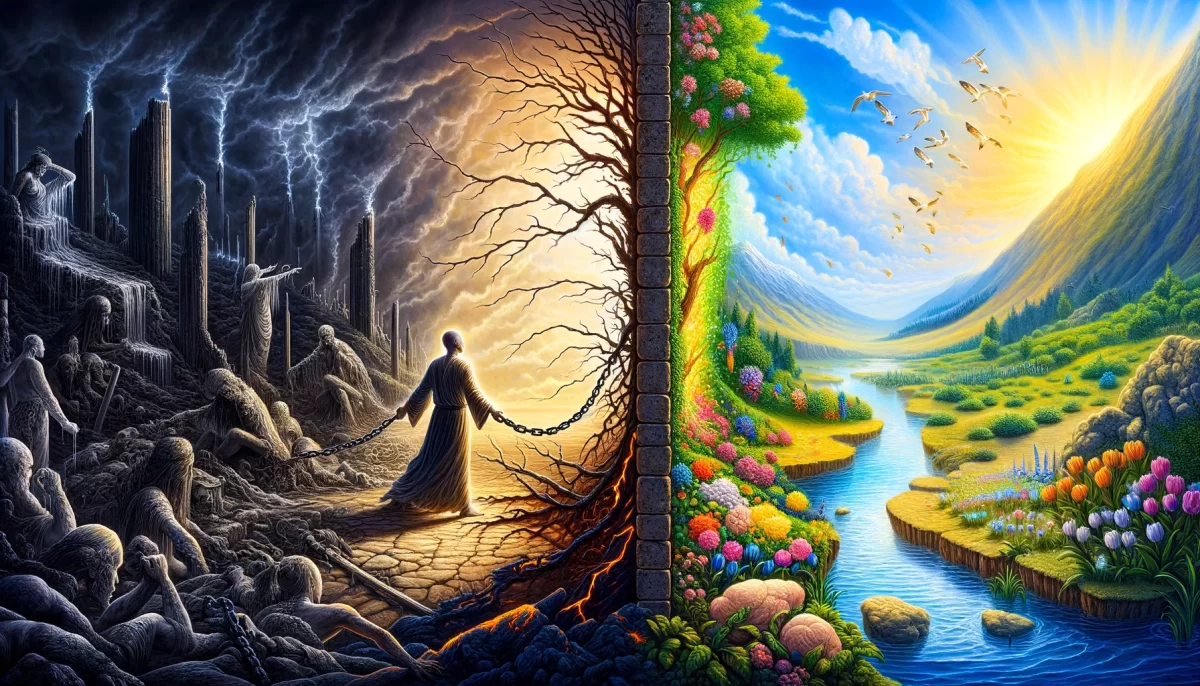
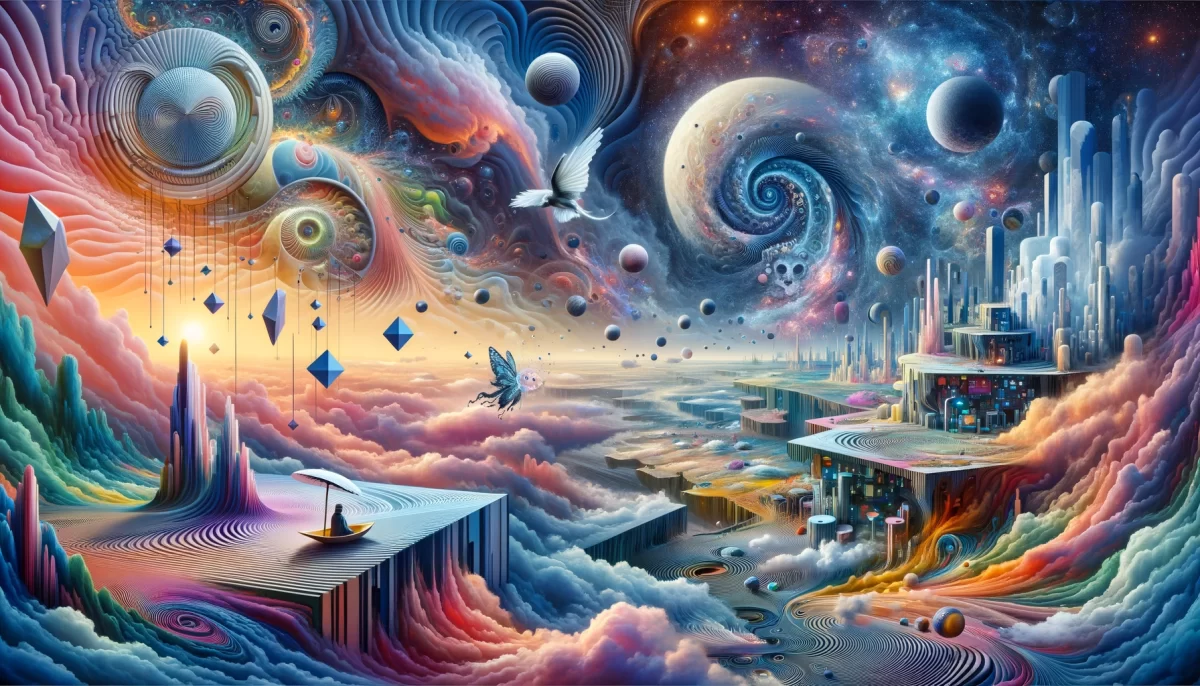
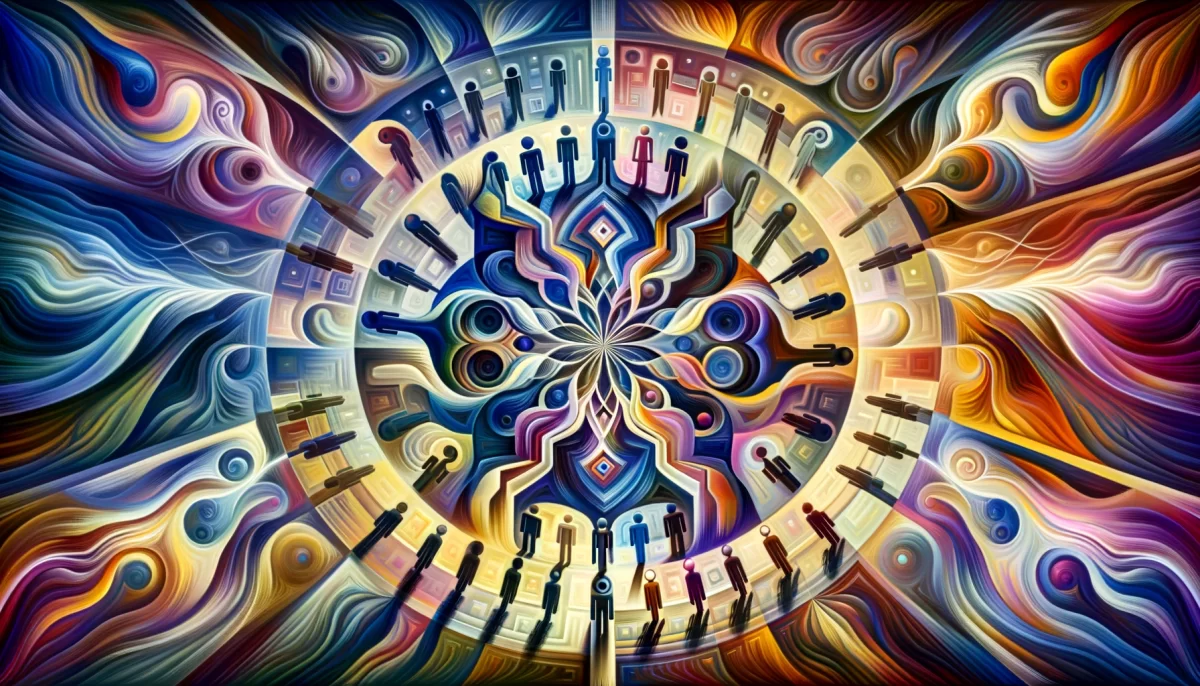
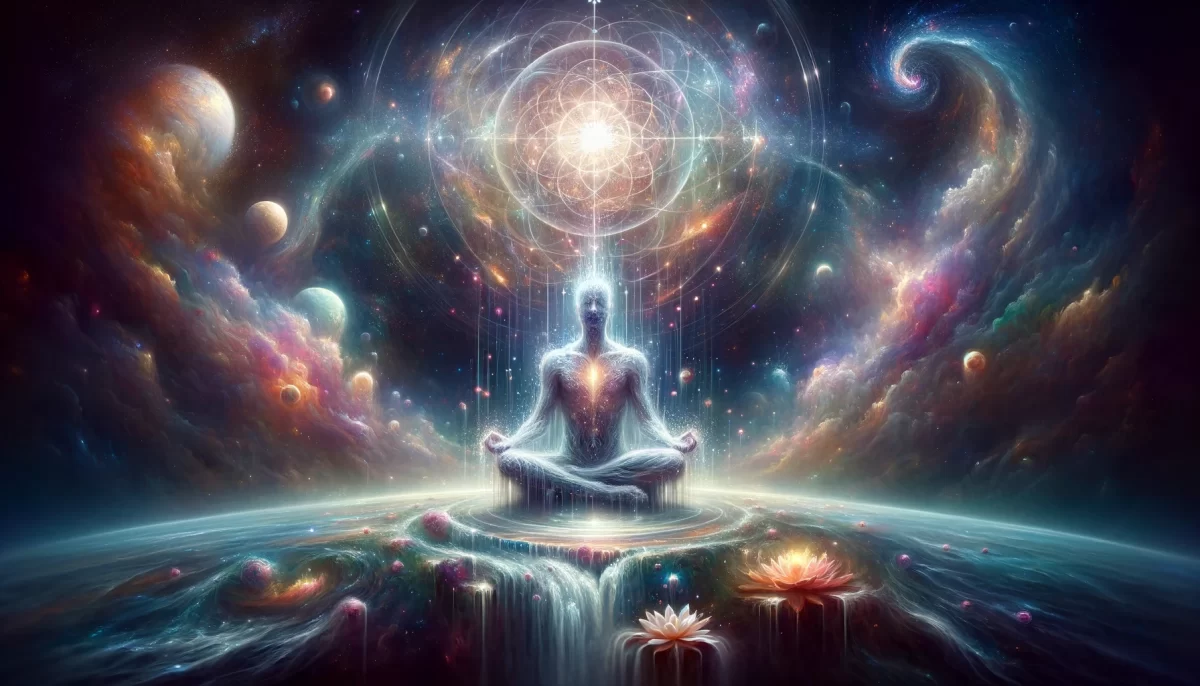

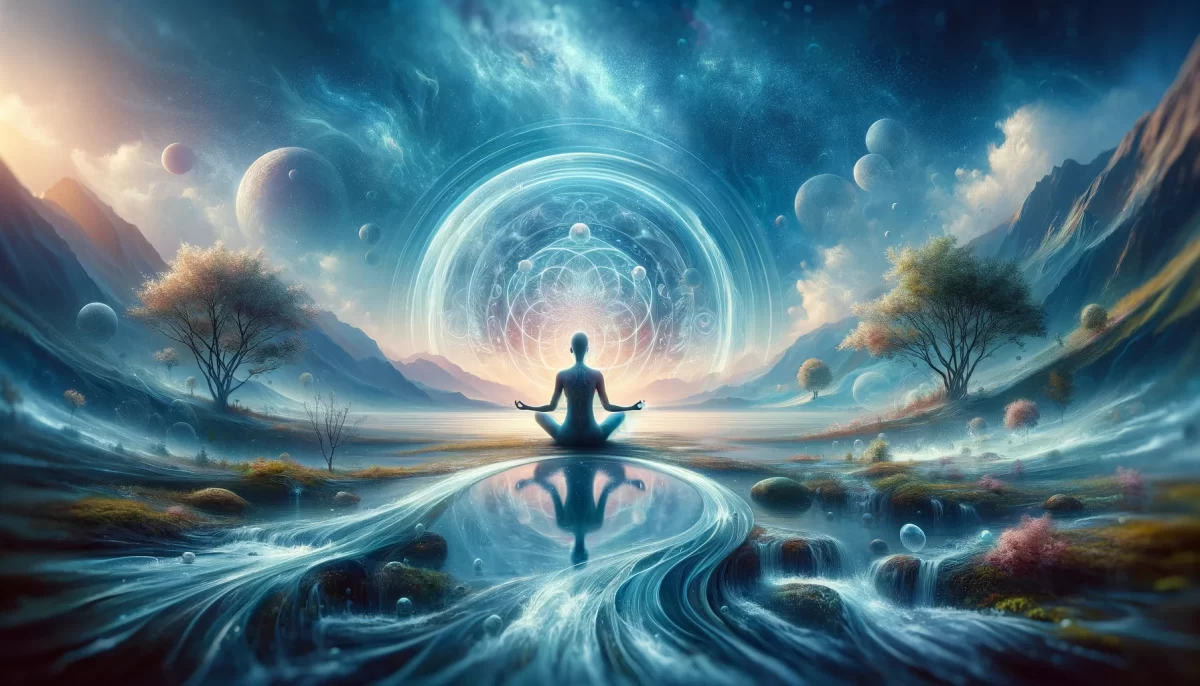

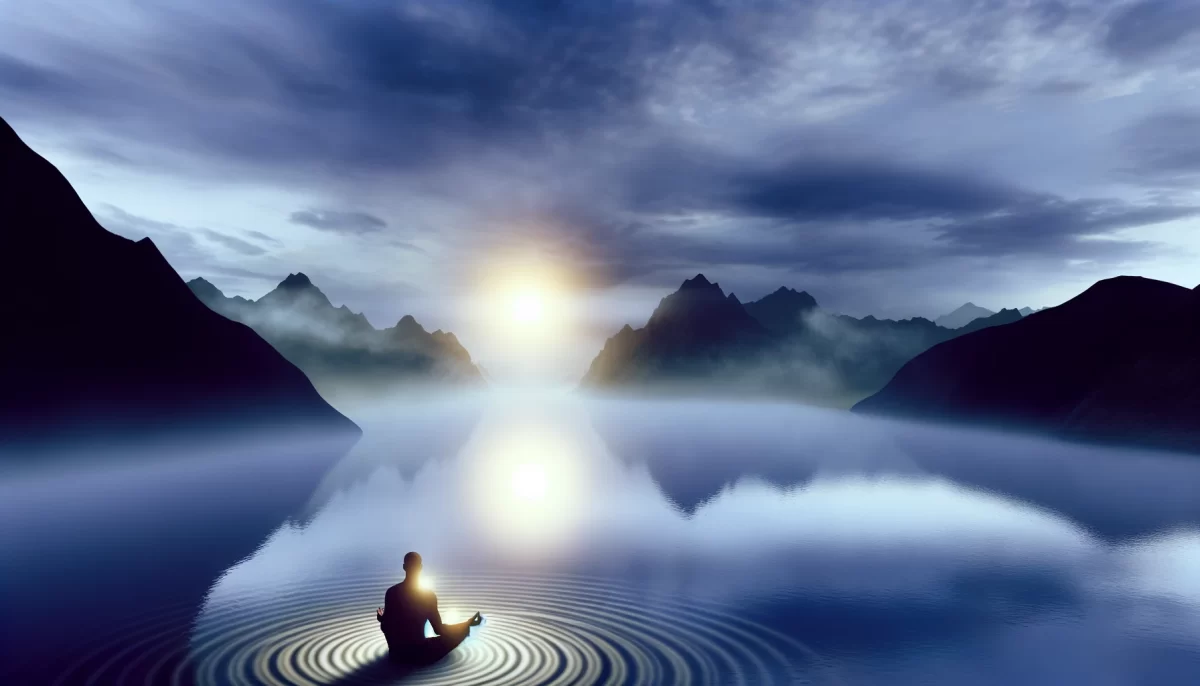
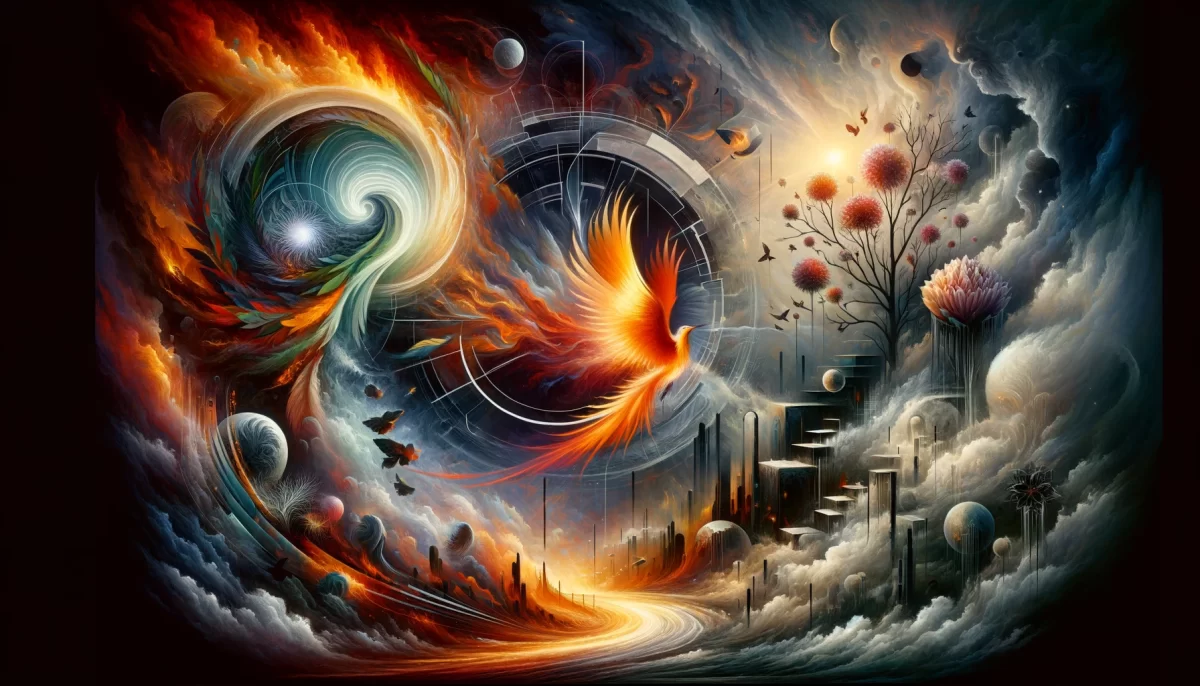
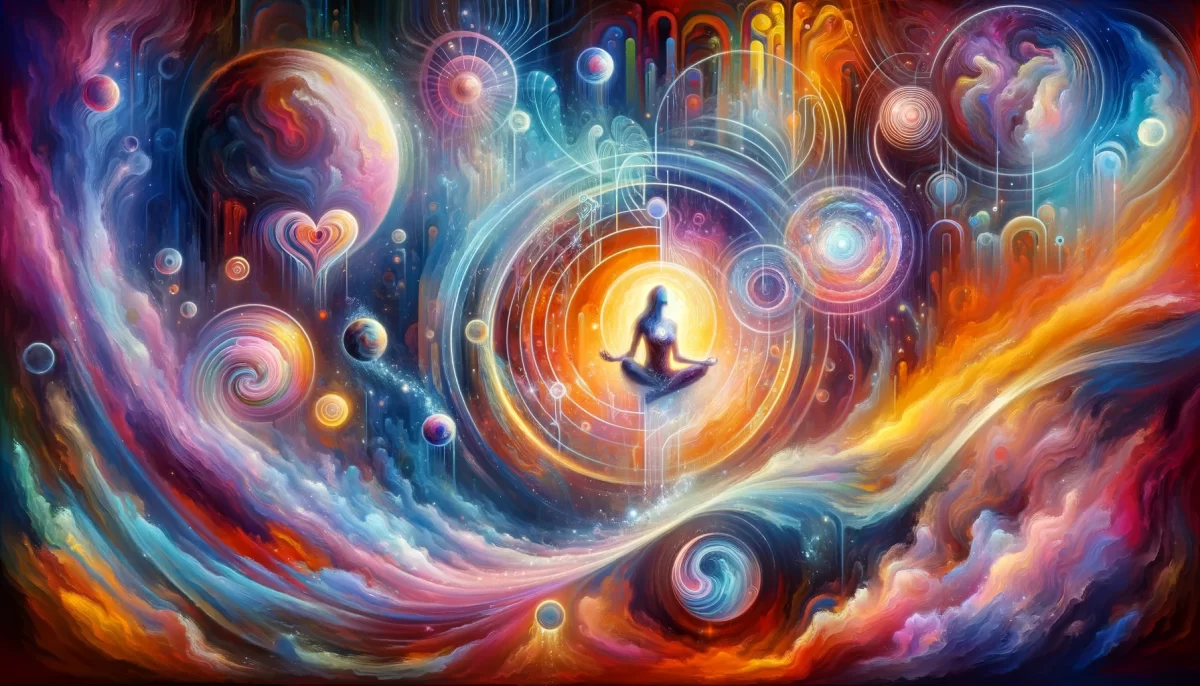
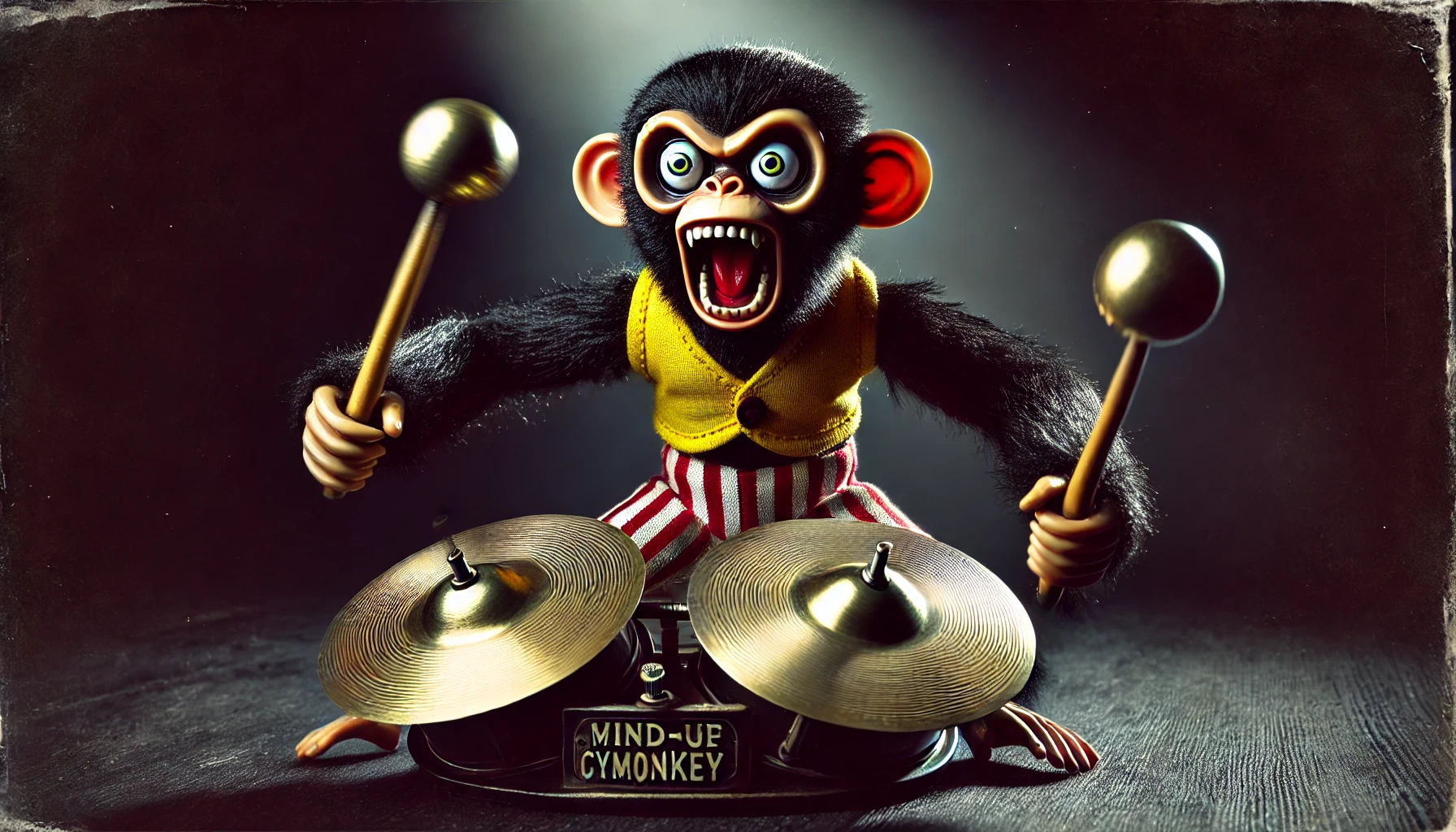
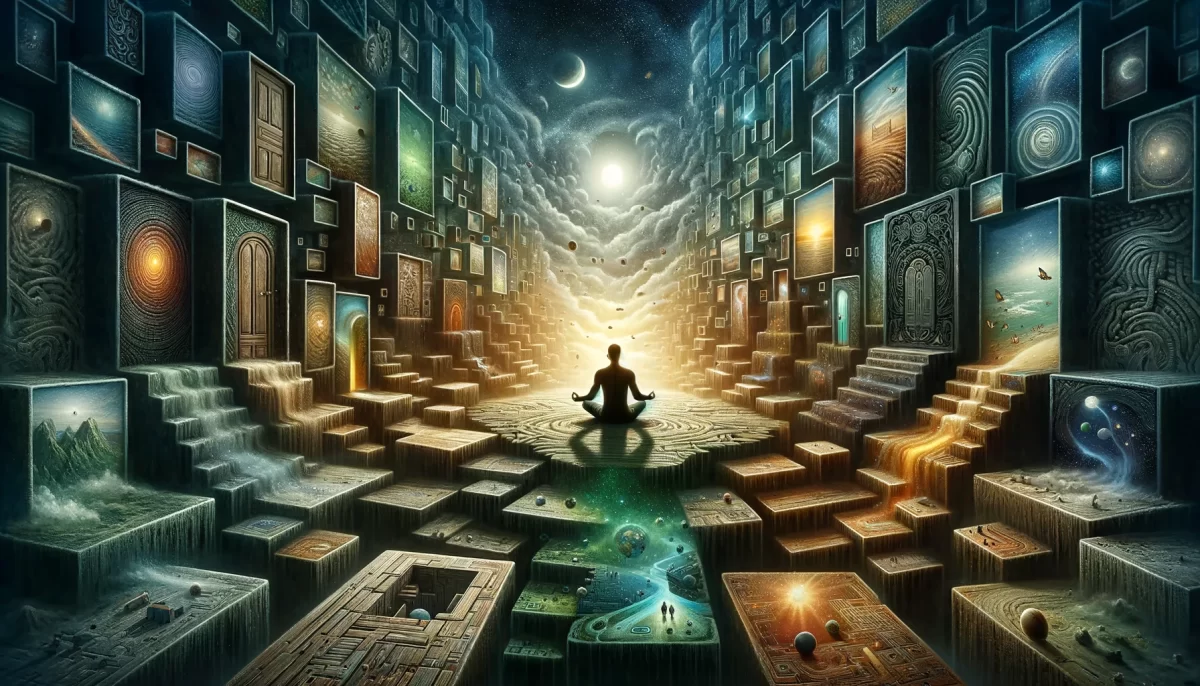
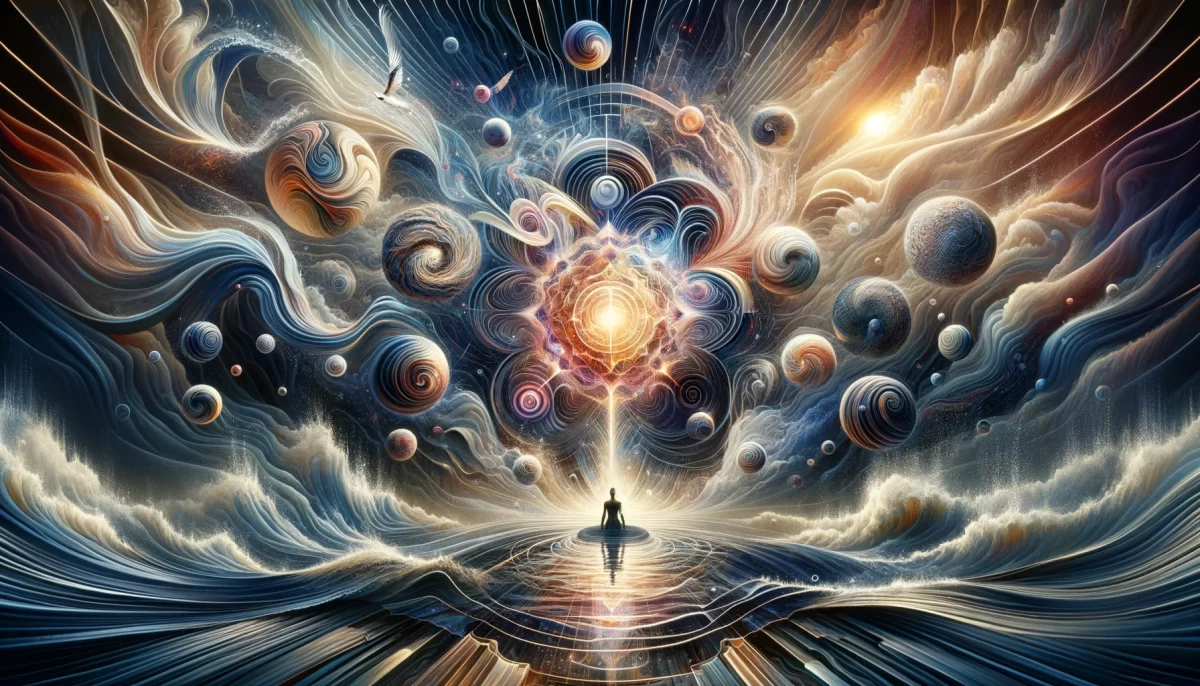
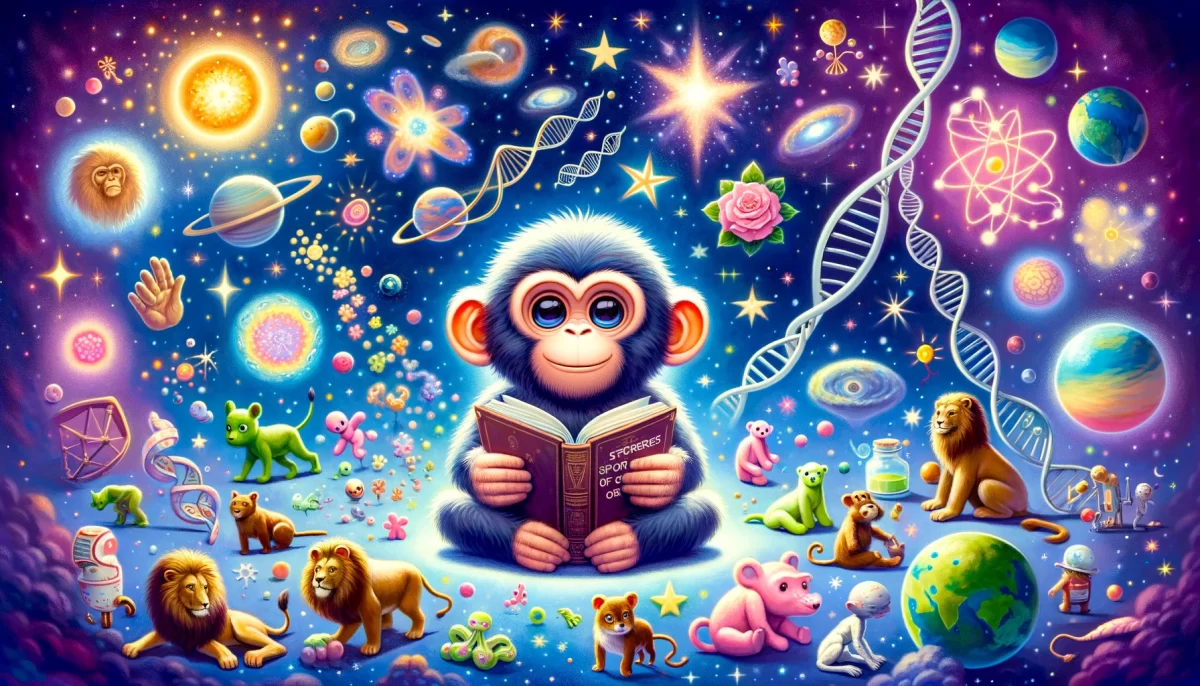
Leave a Reply